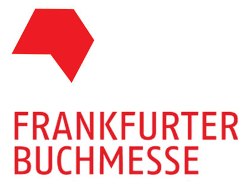 Although the Frankfurt Book Fair was physically smaller than ever--as at so many book world events this year--there was relief and joy that people were meeting again in person; for many it was the first time since 2019, the last pre-pandemic Frankfurt Book Fair. More than 4,000 exhibitors from more than 90 countries had stands, the literary center was sold out, and the fair said there were 93,000 trade visitors and another 87,000 members of the public. (The first two days of the fair were restricted to the trade, and the last three were open to the public as well.)
Although the Frankfurt Book Fair was physically smaller than ever--as at so many book world events this year--there was relief and joy that people were meeting again in person; for many it was the first time since 2019, the last pre-pandemic Frankfurt Book Fair. More than 4,000 exhibitors from more than 90 countries had stands, the literary center was sold out, and the fair said there were 93,000 trade visitors and another 87,000 members of the public. (The first two days of the fair were restricted to the trade, and the last three were open to the public as well.)
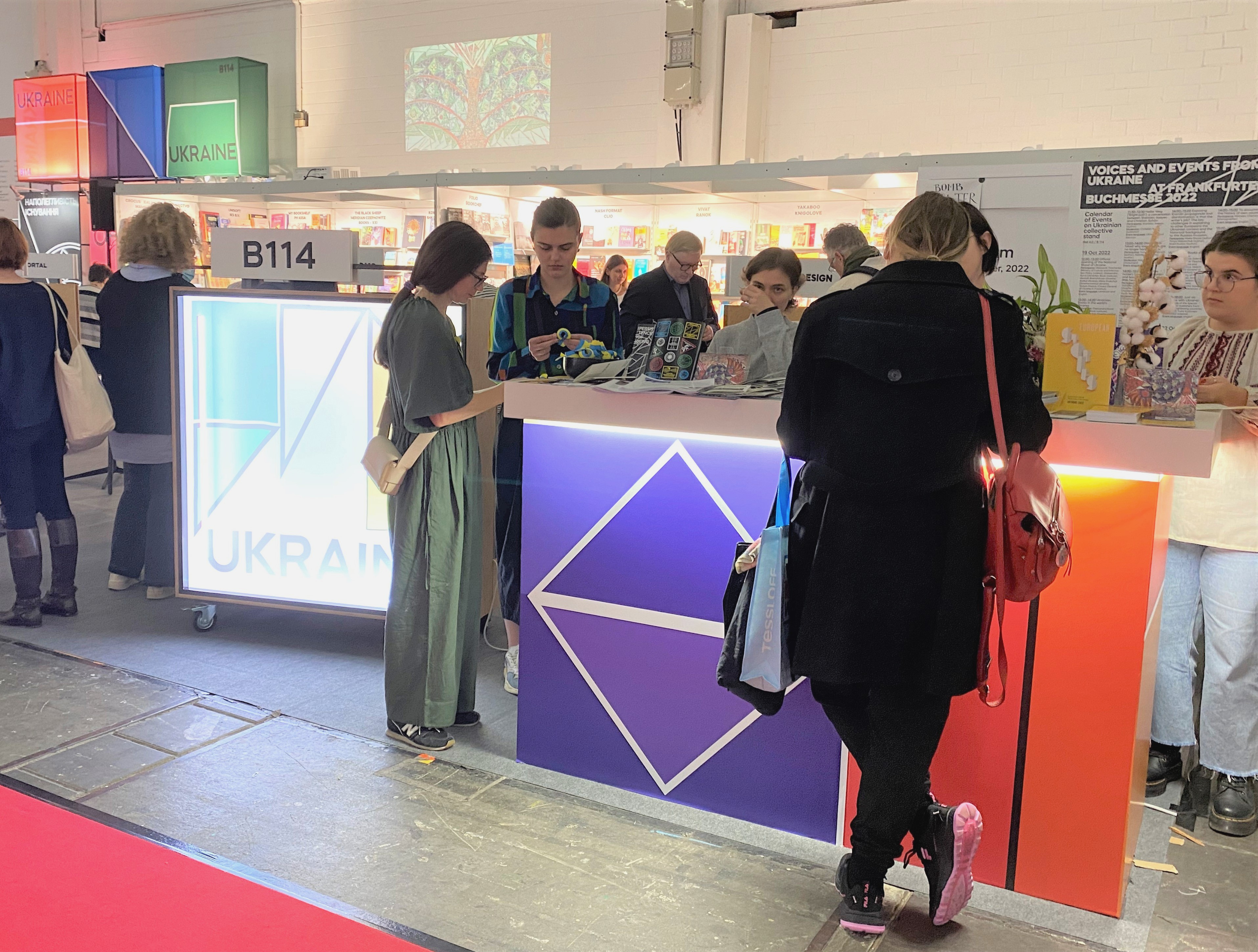 This year Ukraine was a major topic, and fair organizers provided extensive support to Ukrainian book industry representatives, who had a popular stand representing 40 publishers. Extensive programming both highlighted the problems that have followed Russia's invasion of Ukraine and promoted Ukrainian literature. President Volodymyr Zelensky addressed the fair via video from Kyiv, and his wife, Olena Zelenska, made several appearances at the fair, including one in conversation with Elke Büdenbender, wife of German President Frank-Walter Steinmeier.
This year Ukraine was a major topic, and fair organizers provided extensive support to Ukrainian book industry representatives, who had a popular stand representing 40 publishers. Extensive programming both highlighted the problems that have followed Russia's invasion of Ukraine and promoted Ukrainian literature. President Volodymyr Zelensky addressed the fair via video from Kyiv, and his wife, Olena Zelenska, made several appearances at the fair, including one in conversation with Elke Büdenbender, wife of German President Frank-Walter Steinmeier.
Other notable guests included King Felipe VI and Queen Letizia of Spain, who helped open the fair officially. Spain was the guest country this year and had one of the largest contingents of publishers and authors at the fair.
Unlike previous years, there were no Russian exhibitors at this year's fair. As fair president and CEO Juergen Boos said, "We decided not to deal with the Russian government."
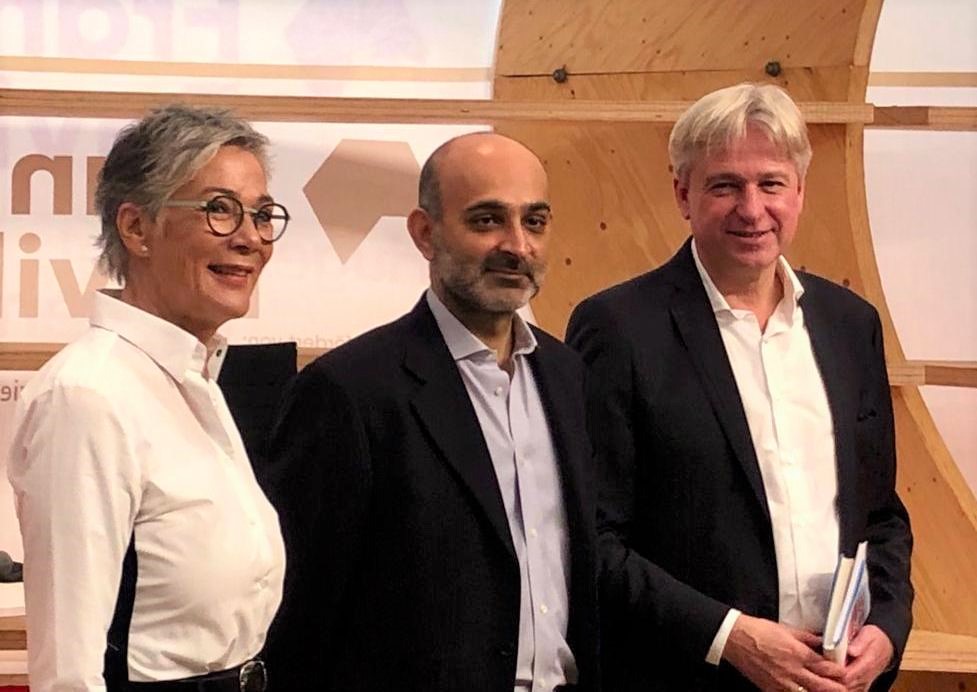 |
| Karin Schmidt-Friderichs, Mohsin Hamid and Juergen Boos at the opening press conference. |
Many speakers spoke of "dark times" and how books and the book industry can fight "the ever deeper fissures that exist between political, cultural and ideological positions," as Karin Schmidt-Friderichs, chair of the Börsenverein, the German book industry association, put it. She said, too, that "in these uncertain times," publishers and booksellers want to provide "a comprehensive selection of literature, nonfiction and scientific and technical information" to help promote international understanding.
Boos and Schmidt-Friderichs emphasized the importance of the fair itself in counteracting negative trends. Schmidt-Friderichs called the fair a place for "peaceful, democratic exchanges." Boos noted that the "personal encounters" taking place among attendees from around the world are more important than ever. "People speak differently with each other when they are face to face," he said, adding, "We firmly believe that the book industry can provide the necessary understanding, whether by translating literature from one language to another, by demonstrating global solidarity with book industry professionals in exile, or by facilitating the international networking that takes place here."
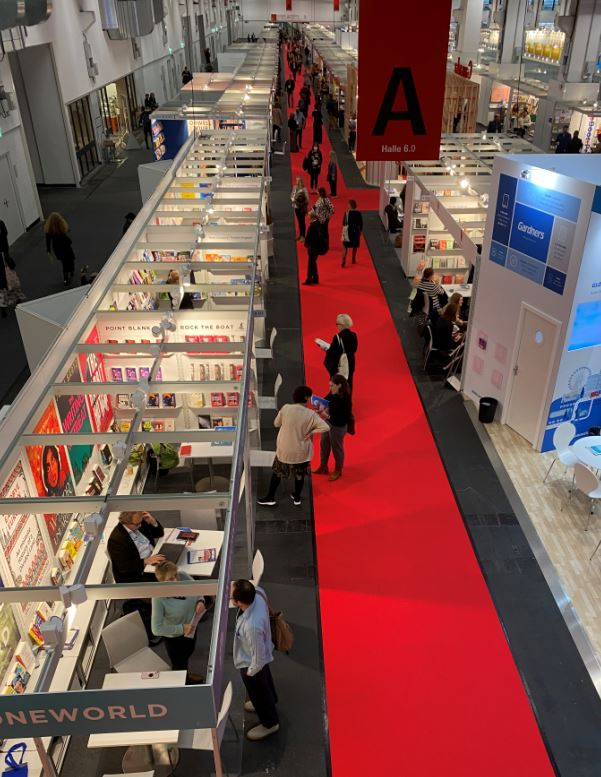 The fair also highlighted translators and translations as well as "translation as a communicative act," all reflected in its official theme, "Translate. Transfer. Transform" and the creation of the first International Translation Centre at the fair. Author Mohsin Hamid emphasized the importance of translation at the opening press conference, saying, "at least half the books that have mattered most to me were written in languages I could not read myself. Without translators, I would have been half the reader that I am." He continued, "Without translators, I would be a fraction of the writer that I am.... Translators are profoundly vital. In the world today, a world of rising xenophobia and nativism, a world preoccupied with the construction of walls, translators made windows and doors."
The fair also highlighted translators and translations as well as "translation as a communicative act," all reflected in its official theme, "Translate. Transfer. Transform" and the creation of the first International Translation Centre at the fair. Author Mohsin Hamid emphasized the importance of translation at the opening press conference, saying, "at least half the books that have mattered most to me were written in languages I could not read myself. Without translators, I would have been half the reader that I am." He continued, "Without translators, I would be a fraction of the writer that I am.... Translators are profoundly vital. In the world today, a world of rising xenophobia and nativism, a world preoccupied with the construction of walls, translators made windows and doors."
'Winter Is Coming'
In much of the book industry and in many countries, there was a noticeable similarity of reports on the current state of the book world. Many publishers and booksellers happily reported surviving--and even thriving--during the Covid pandemic, and improving ways of doing business that will continue into the future. But most everyone is anxious about what might happen in the next year or two. A phrase repeated quite a few times: "Winter is coming."
In many countries, the culprits are the same: high rates of inflation, soaring energy costs, difficulty finding employees, paper shortages, occasional, continuing supply chain disruptions and more.
In Germany, Schmidt-Friderichs said, booksellers are expecting energy costs this winter to rise by up to 300%. At the same time, sales for the first nine months of the year in bookstores are down 8.7% compared to 2019. Book sales overall in Germany have fallen in each of the last five months through September and are down 2% for the year compared to 2019. In addition, in the past year, book publishers had to pay on average 50% more for the printing and production of books; in the coming year, they expect to pay another 20%-30%.
As she put it, "The book sector has proved remarkably resilient over the past two years. However, the unstable world and market situation present it with new major challenges." She called for help from the government in a variety of ways, including direct financial support and support to promote reading to consumers.
 |
| Charlie Redmayne |
Speaking at Publishing Perspectives' Executive Talk event, hosted by Porter Anderson, Charlie Redmayne, CEO of HarperCollins UK, outlined similar cost pressures. After a "record year" in 2021, when putting the annual budget together in January, the company had estimated energy costs--which are especially important in connection with its 750,000-square-foot warehouse in Scotland--would increase 70%. "They've actually gone up 250%," he said. Other costs are rising, too, including paper, printing and freight. The company is "making sure to mitigate against those costs as much as possible [but] it's going to be tough." He said companies shouldn't have "knee-jerk reactions" and should have begun planning some time ago. "You need to be cutting your cloth accordingly throughout," he continued. "You need to always be looking to see how you maximize your revenues and also make sure that your cost basis is fit for purpose." He observed that in the last major recession of 2008-2009, the publishers who cut a lot of staff were the slowest to recover, and cautioned publishers from making major layoffs.
Redmayne noted the concern that consumer discretionary income may be squeezed during a recession, resulting in fewer book purchases, but said that book prices "have been incredibly cheap a very, very long time," making books an "incredibly good value." Another positive trend: more men and boys were reading during the pandemic and audiobooks continue to attract more and more males and younger people. "I don't care how people consume our authors' content," he said. "For me, the most important thing is that they do and that they pay for it." --John Mutter
 "Since our biggest competitor is not Harvard Book Store down the street from us or Belmont Books in the next town, but Amazon, that helped independents. Look, our numbers are still tiny, we're still a tiny percentage of the market.... I'm not saying Jeff Bezos is quaking in his boots because of independent bookstores. But I do think that one thing the pandemic did is make people hate Amazon a little bit more. And the alternative to Amazon, when you're talking about books, is indie bookstores."
"Since our biggest competitor is not Harvard Book Store down the street from us or Belmont Books in the next town, but Amazon, that helped independents. Look, our numbers are still tiny, we're still a tiny percentage of the market.... I'm not saying Jeff Bezos is quaking in his boots because of independent bookstores. But I do think that one thing the pandemic did is make people hate Amazon a little bit more. And the alternative to Amazon, when you're talking about books, is indie bookstores."









 Art dealer and gallerist Harper Levine "is expanding his empire" with a new
Art dealer and gallerist Harper Levine "is expanding his empire" with a new 

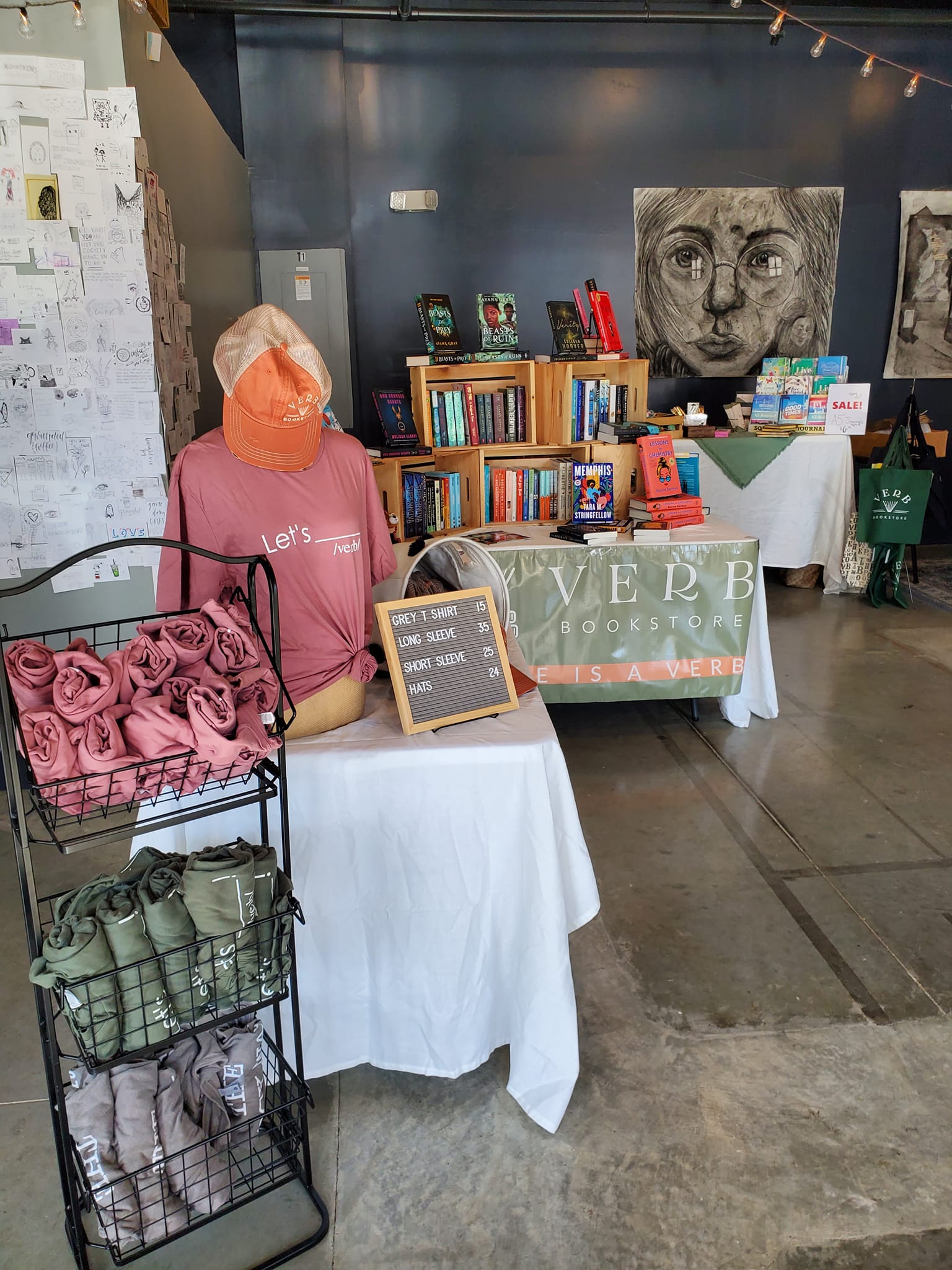
 Remodeling and maintaining the Airstream, Harlow continued, took longer than expected, and she and her husband faced the choice of spending their weekends working on it or "getting out in the community" and doing conventional pop-up appearances. At the same time, the demand for a bricks-and-mortar store in Jonesboro was immense.
Remodeling and maintaining the Airstream, Harlow continued, took longer than expected, and she and her husband faced the choice of spending their weekends working on it or "getting out in the community" and doing conventional pop-up appearances. At the same time, the demand for a bricks-and-mortar store in Jonesboro was immense.
 Although the Frankfurt Book Fair was physically smaller than ever--as at so many book world events this year--there was relief and joy that people were meeting again in person; for many it was the first time since 2019, the last pre-pandemic Frankfurt Book Fair. More than 4,000 exhibitors from more than 90 countries had stands, the literary center was sold out, and the fair said there were 93,000 trade visitors and another 87,000 members of the public. (The first two days of the fair were restricted to the trade, and the last three were open to the public as well.)
Although the Frankfurt Book Fair was physically smaller than ever--as at so many book world events this year--there was relief and joy that people were meeting again in person; for many it was the first time since 2019, the last pre-pandemic Frankfurt Book Fair. More than 4,000 exhibitors from more than 90 countries had stands, the literary center was sold out, and the fair said there were 93,000 trade visitors and another 87,000 members of the public. (The first two days of the fair were restricted to the trade, and the last three were open to the public as well.) This year Ukraine was a major topic, and fair organizers provided extensive support to Ukrainian book industry representatives, who had a popular stand representing 40 publishers. Extensive programming both highlighted the problems that have followed Russia's invasion of Ukraine and promoted Ukrainian literature. President Volodymyr
This year Ukraine was a major topic, and fair organizers provided extensive support to Ukrainian book industry representatives, who had a popular stand representing 40 publishers. Extensive programming both highlighted the problems that have followed Russia's invasion of Ukraine and promoted Ukrainian literature. President Volodymyr 
 The fair also highlighted translators and translations as well as "translation as a communicative act," all reflected in its official theme, "Translate. Transfer. Transform" and the creation of the first International Translation Centre at the fair. Author Mohsin Hamid emphasized the importance of translation at the
The fair also highlighted translators and translations as well as "translation as a communicative act," all reflected in its official theme, "Translate. Transfer. Transform" and the creation of the first International Translation Centre at the fair. Author Mohsin Hamid emphasized the importance of translation at the 

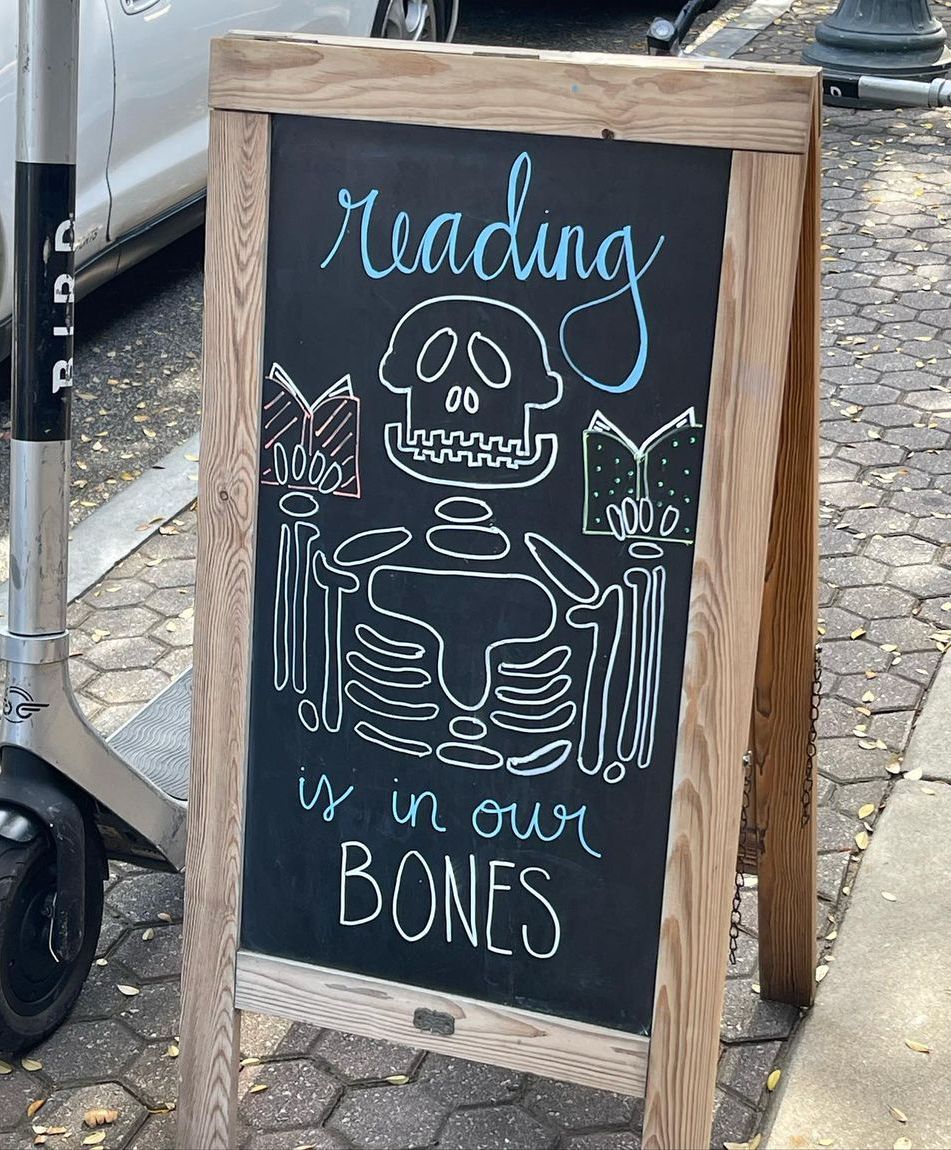

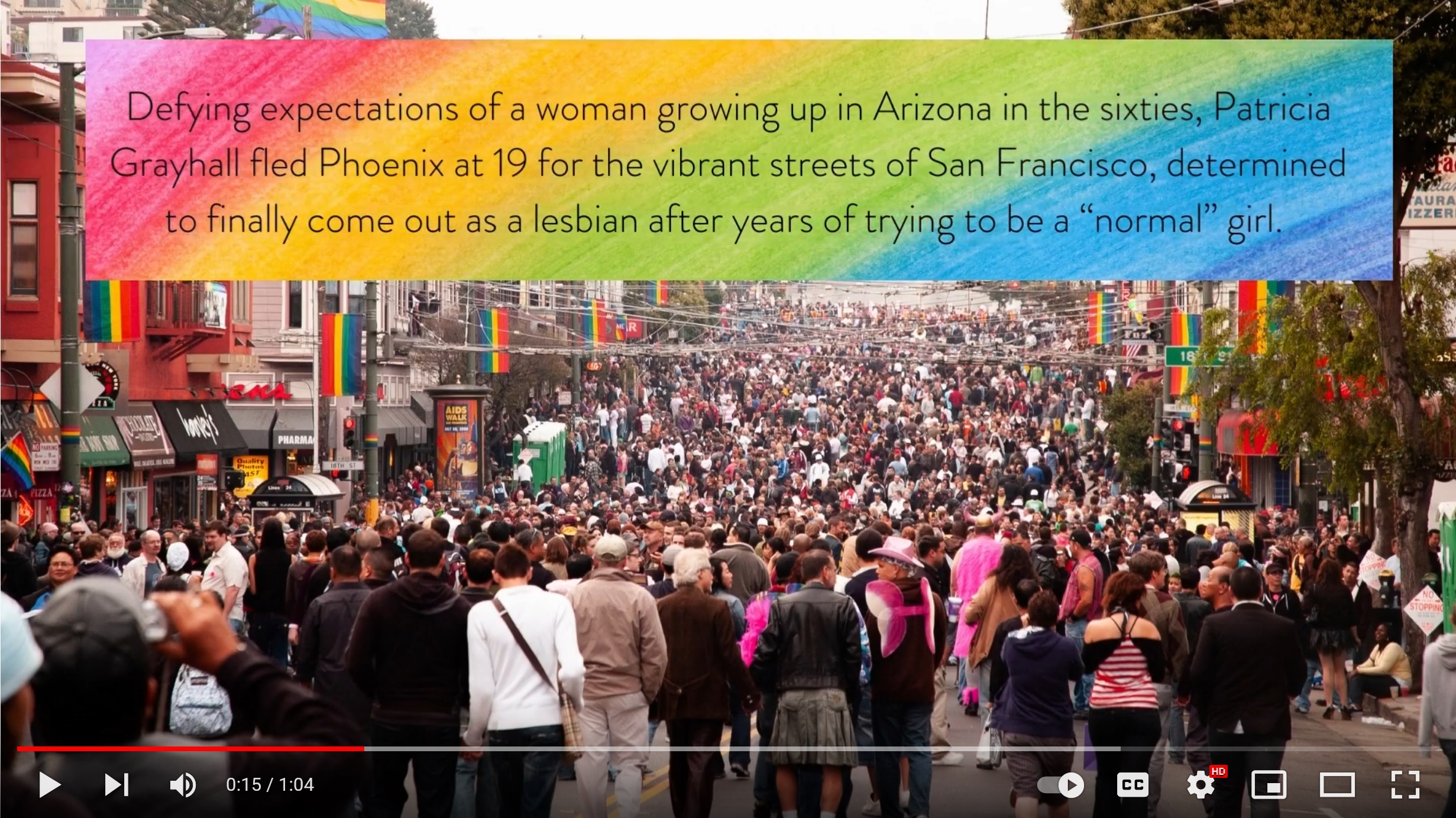 Making the Rounds
Making the Rounds In her second adult romance, Astrid Parker Doesn't Fail, Ashley Herring Blake expertly employs humor and angst to set two lost women on a rocky path to happily ever after. After a devastating divorce and a memorable incident in which she might have set fire to one of her custom-made cabinets while on a job, Jordan Everwood returns home at the request of her twin brother to be lead carpenter on the renovation of their family's ancestral home, the Everwood Inn. To boost her similarly floundering interior design business, Astrid Parker signs on as lead designer for an episode of Innside America.
In her second adult romance, Astrid Parker Doesn't Fail, Ashley Herring Blake expertly employs humor and angst to set two lost women on a rocky path to happily ever after. After a devastating divorce and a memorable incident in which she might have set fire to one of her custom-made cabinets while on a job, Jordan Everwood returns home at the request of her twin brother to be lead carpenter on the renovation of their family's ancestral home, the Everwood Inn. To boost her similarly floundering interior design business, Astrid Parker signs on as lead designer for an episode of Innside America.